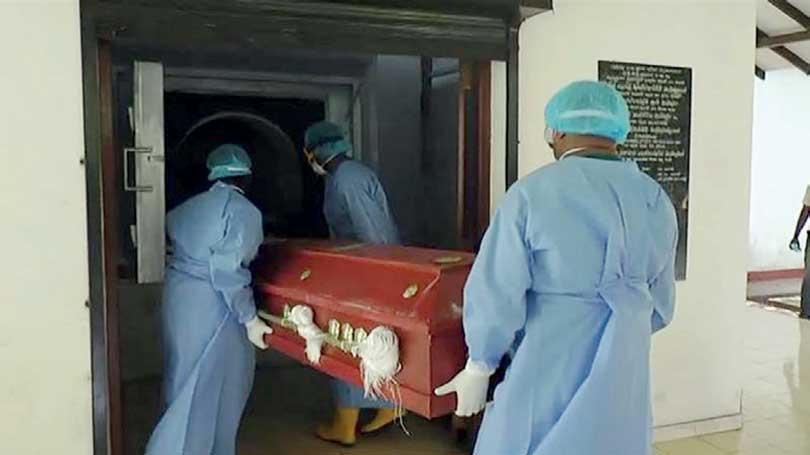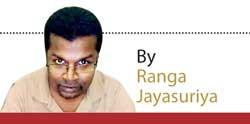Reply To:
Name - Reply Comment

The last rites of a coronavirus victim
 Some quarters of Sri Lankans are indulging in a needlessly-caused and equally stubbornly promoted debate over the funeral managements of the Muslim COVID-19 victims. Last week, a 64-year-old Muslim man from Kochchikade, the second locally reported coronavirus related death, was cremated under the standard operating procedure (SOP) adopted by the Ministry of Health on the disposal of dead bodies related to the virus. The local guidelines restricted the viewing of the body, banned public funerals and washing of the body and mandated compulsory cremation. Burial was not given as an option in the original circular.
Some quarters of Sri Lankans are indulging in a needlessly-caused and equally stubbornly promoted debate over the funeral managements of the Muslim COVID-19 victims. Last week, a 64-year-old Muslim man from Kochchikade, the second locally reported coronavirus related death, was cremated under the standard operating procedure (SOP) adopted by the Ministry of Health on the disposal of dead bodies related to the virus. The local guidelines restricted the viewing of the body, banned public funerals and washing of the body and mandated compulsory cremation. Burial was not given as an option in the original circular.
The move provoked vocal protests by the Muslim community leaders and civil society groups who have demanded that the Muslims be allowed to bury their loved ones in accordance with Islamic burial rites.
SLMC leader Rauff Hakeem who first raised concerns argued that it was “unfortunate, regrettable and of course reprehensible that the Janaza of the Negombo Victim of the COVID 19 virus had been cremated without permitting the burial as is ordained in our faith.”
In the same week, a second Muslim man from Maradana died due to complications from the coronavirus infection and was also cremated.
As of noon yesterday (6), there were five coronavirus-related deaths and 176 confirmed cases in the country.
After the last week’s controversy over the mandatory cremation, the Ministry of Health issued a fresh update on its Provisional Clinical Practice Guidelines on COVID-19 Suspected and Confirmed patients, requiring that the disposal of bodies of patients who succumbed to the coronavirus should exclusively be through cremation.
Whereas, Muslims community leaders and civil rights groups have argued that the World Health Organization (WHO) guidelines, which the local health officials claim to be following, also allow for both cremation and burial of the dead.
WHO’s Interim guidelines issued on March 24 on ‘the infection prevention and control for the safe management of a dead body in the context of COVID-19’ states, “people who have died from COVID-19 can be buried or cremated”
It also adds that the funeral management practices may “confirm to national and local requirements that may dictate the handling and disposition of the remains” and family and friends may view the body after it has been prepared for burial, in accordance with customs.”
“They should not touch or kiss the body and should wash hands thoroughly with soap and water after the viewing…”
Director General of Health Services, Dr Anil Jasinghe has defended the local procedure, stating that the burial is not feasible due to the high water table and possible seepage of water into the grave. He has also argued that burial would complicate the funeral management process, requiring the remains to be transported over a long distance, effectively leading to possible contamination. Whereas the current standard operating procedure requires the cremation at the nearest crematorium.
However, last week, the Government Medical Officers Association (GMOA), which represents government doctors ventured into the debate and called on the Director-General of Health Services, Dr Jasinghe to consult experts in the relevant field to decide on the best course of practice on the disposal of bodies of those who succumbed to the Coronavirus. The GMOA noted that the local Quarantine Act and the WHO guidelines allowed the option of both cremation and burial as methods of disposal of bodies.
The Sri Lankan guidelines are also a departure from much of the world. In the UK, emergency regulations were amended to allow the burial for Muslim and Jewish victims of the virus pandemic. In Australia, local guidelines have allowed the burial in leak-proof bags.
Away from epidemoigist calculations, the current procedure on mandatory cremation is complicating the already fragile ethnic relations in the country. The Muslims view the forced cremations as defiling of their dead. For Muslims, cremation is not only prohibited, but it is also viewed as a desecration of the deceased.
The mandatory cremation is increasingly being projected, rightly or wrongly, as part of a wider racist Sinhala-Buddhist majoritarian policy. These grievances could feed into the radicalization of some quarters of Muslims, which -- though most elders in the community deny -- is an ongoing security concern.
Also, protestations by the Muslims over the mandatory cremation could well trigger a fresh wave of Islamophobia within the majority community, even while an earlier wave of Islamabophia in the wake of the Easter Sunday attacks are somewhat alive.
Already, there are also signs of rising Islamaphobia, in part aided by the dog-whistling television coverage, and the social media chatter.
The mandatory cremation of Muslim COVID-19 victims would polarize the country at a time it should be unified.
There is also an equally important but rather overlooked danger of the decision.
It could discourage some members of the Muslim community from going to the hospital when they get ill. It would compel families to hide their loved ones infected with COVID-19, seek treatment at home, and potentially dispose of the dead by themselves. In the process, they will inadvertently get infected and then spread the virus.
When the virus and the patients retreat into dark corners, the government would never know the full scope of the outbreak. No formidable intelligence service could trace the contacts of the virus when they are deliberately shielded and infection grows at an exponential rate.
Already, there are several clusters of the virus in predominantly Muslim residential areas in Akurana, Maradana, Pannila and Atalugama. These villages and housing blocks are sealed off and high-risk individuals have been sent to quarantine centres. Contact-tracing of those who associated with the patients are on-going, but nothing is failproof.
Given the crowded living conditions, certain social groups are more succeptible to the spread of the virus.
If the discourse on coronavirus shifts from mitigation of the pandemic to preserving burial rites, there will always be some individuals, who would opt for the latter at the expense of the former. In the process, they would set off silent chains of community spread.
Local health officials who make decisions that transcend purely medical considerations, should also asses the wider social consequences. Repercussions of the current decision on mandatory cremation overweigh its intended objectives. It could defeat the purpose and unleash an unintended horror.
The government should rethink its position on the mandatory cremation of Covid19 victims, if not for religious concerns, but for its potentially deadly payback.
Follow @RangaJayasuriya on Twitter